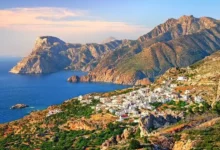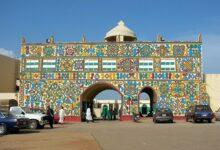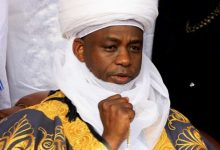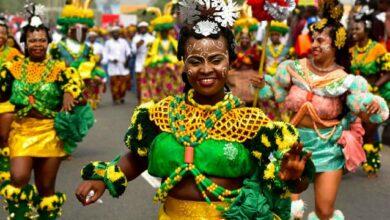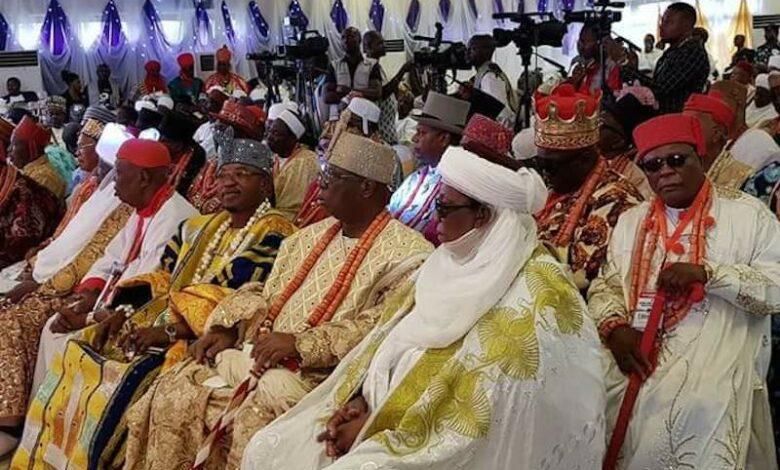
Roles Of Traditional Rulers In Nigeria
Roles Of Traditional Rulers In Nigeria- Traditional ruler is a term used to refer to the traditional leader of an ethnic group or clan who now holds the position of highest traditional authority within that group or clan and whose title is recognized as the traditional ruler title by the government of the state.
Traditional leaders are frequently more successful than many modern politicians at resolving land disputes and other problems such as killing, kidnapping, robbery. Their purpose is to prevent any enmity from developing within the community.InformationGuideNigeria
👉 Relocate to Canada Today!
Live, Study and Work in Canada. No Payment is Required! Hurry Now click here to Apply >> Immigrate to CanadaUnfortunately, rural communities still frequently experience land disputes. In this circumstance, the authorities make an effort to uphold tranquility and settle conflicts amicably.
Traditional rulers play a crucial role in the Nigerian society. They are the custodians of culture, history, and tradition in their respective communities. In this article, we will discuss 15 roles of traditional rulers in Nigeria.
Read Also: The Role Of Mass Media In Nigeria
History Of Traditional Rulers In Nigeria?
Before the creation of the current Nigeria, separate groups or states had traditional leaders known as chiefs or kings. The traditional leaders nevertheless command a great deal of authority while not having any real governmental power.
Monarchy is the main form of traditional rulership to this day. Many different ethnic groups inhabited the modern-day Nigerian territory during the pre-colonial era. These groups were categorized into empires and rules by empire title heads that were the political figures.
Many traditional leaders merely had symbolic significance throughout the colonial era. As a result, traditional leaders occasionally served as a channel of communication between the colonial government and the local populace.
Read Also: The Role Of Mass Media In Economic Development In Nigeria
Types Of Traditional Rulers in Nigeria
1. Alaafin of Oyo:
Alaafin of Oyo is a monarch who is widely regarded throughout Yorubaland, he reigns alongside a king with several wives. One of the most prestigious and prominent monarchical titles one can hold in Nigeria is Alaafin of Oyo.
👉 Relocate to Canada Today!
Live, Study and Work in Canada. No Payment is Required! Hurry Now click here to Apply >> Immigrate to CanadaLamidi Olayiwola Adeyemi III, the reigning Alaafin of Oyo, succeeded Alaafin Gbadegesin Ladigbolu II to the throne in 1970.
2. Sultan of Sokoto:
The person formally known as the “Sultan of Sokoto” is one of the most important kings in the north.
Since the British colonization, the role of Sultan has become more ceremonial, but Fulani and Hausa people from northern Nigeria still value it highly.Roles Of Traditional Rulers In Nigeria
3. Ooni of Ife:
The traditional head of state of Ile-Ife is known as the “Ooni of Ilé-Ife.” Ife refers to the inhabitants of the significant Yoruba city of Ile-Ife. It is a dynasty with a long history dating back many centuries.
The current monarch, Ooni Adeyeye Enitan Ogunwusi Ojaja II, rules over the ancient city of Ile-ife in southwest Nigeria.
Read Also: The Role Of The Code Of Conduct Tribunal In Nigeria
4. Emir of Kano:
The Kano Emirate was established in 1805, and its ruler is known as the Emir of Kano. History states that the Emirate was established when the Sokoto Caliphate annexed the former Hausa Sultanate of Kano during the Fulani Jihad.
Roles Of Traditional Rulers In Nigeria?
Some of the key roles of traditional rulers in Nigeria are discussed below.200 Romantic Love Message
1. Maintenance Of Peace And Security:
Traditional rulers are responsible for maintaining peace and security in their communities. They mediate disputes and conflicts, and ensure that the law is upheld.20 Best Gas Cookers Pictures and their Prices in Nigeria
2. Community Development:
Traditional rulers are involved in the development of their communities. They work with the government and other stakeholders to identify and implement developmental projects that benefit the community.
3. Promotion Of Culture And Tradition:
Traditional rulers are the custodians of culture and tradition in their communities. They are responsible for preserving and promoting the culture and tradition of their people.JAMB Portal
4. Preservation Of History:
Traditional rulers are responsible for preserving the history of their communities. They work to ensure that the history of their people is passed down to future generations.105 Good Morning Love Messages
5. Conflict Resolution:
Traditional rulers are involved in the resolution of conflicts and disputes within their communities. They use their knowledge of culture and tradition to mediate disputes and find solutions that are acceptable to all parties.
6. Representation Of the Community:
Traditional rulers are the representatives of their communities at the local and national levels. They serve as the voice of their people and ensure that their needs and concerns are heard and addressed.
Read Also: The Role Of Central Bank In Economic Development Of Nigeria
7. Advising The Government:
Traditional rulers are consulted by the government on issues that affect their communities. They provide valuable insights and advice on how to address the challenges facing their communities.
8. Promotion Of Education:
Traditional rulers are involved in the promotion of education in their communities. They work with the government and other stakeholders to improve access to education and increase the enrollment of children in schools.NYSC Portal
9. Support For Small Businesses:
Traditional rulers are supportive to small businesses in their communities. They provide assistance and guidance to small business owners and entrepreneurs, and encourage the growth of the local economy.
10. Encouragement Of Community Participation:
Traditional rulers encourage community participation in decision-making processes. They encourage the involvement of community members in the development and implementation of projects that benefit the community.
11. Protection Of The Environment:
Traditional rulers are involved in the protection of the environment in their communities. They work with the government and other stakeholders to promote sustainable development and preserve the natural resources of their communities.Best MTN Hynetflex in Nigeria and their prices
12. Religious And Cultural Festivals:
Traditional rulers are involved in the organization and celebration of religious and cultural festivals in their communities. They ensure that these festivals are carried out in accordance with tradition and are an important part of community life.
13. Promotion Of Health And Wellbeing:
Traditional rulers are involved in the promotion of health and wellbeing in their communities. They work with the government and other stakeholders to improve access to healthcare and promote healthy lifestyles.
14. Community Mobilization:
Traditional rulers are responsible for mobilizing the community to participate in development projects and other activities that benefit the community. They use their knowledge of the community to engage and mobilize community members to take action.
15. Preserving The Natural Environment:
Traditional rulers are involved in the preservation of the natural environment in their communities. They work to protect the forests, rivers, and other natural resources of their communities and ensure that they are preserved for future generations.
Read Also: The Role Of Broadcast Journalism In Nigeria
Conclusion
Traditional rulers play a vital role in the Nigerian society. They are the custodians of culture, history, and tradition, and they are involved in the development and preservation of their communities.
They work closely with the government and other stakeholders to address the challenges facing their communities and ensure that their needs and concerns are heard and addressed.
Check JAMB Result
Check and Confirm: How much is Dollar to Naira

